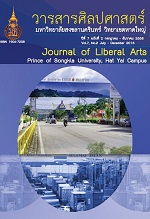A Study and development of 3-Self Health behaviors program for risky traffic policemen
Keywords:
3-Self Health Behaviors, PROMISe Model, laughter Siam, traffic policemenAbstract
The purpose of this research was to study and develop 3-Self Health Behaviors (self-efficacy, self-regulation and self-care). There were two phases in this study. Phase one, the researcher studied the factors of 3-Self Health Behaviors with 350 risky traffic policemen, and collected the data by using 3-Self questionnaires with 4 rating scales. Second order confirmatory factor analysis technique was utilized to analyze the collected data. The research finding revealed that factor model corresponded to the empirical evidence with the congruence index as follows; = 647.67(df= 325, p-value < .01), Relative
= 1.99, GFI = .91, AGFI = .90, RMR = .015; SRMR= .082 และ RMSEA = .048 The factor loading for each determinant was .95, .87 and .59, respectively. Phase two, using laughter therapy (Laughter Siam) associated with principles of the PROMISe Model (P = Positive reinforcement, R = Results based management, O=Optimism, M = Motivation, I = Individual or Client Centered and Se = Self-esteem) to modify the health behaviors of 30 risky traffic policemen. Data were analyzed by t-test dependent. The results showed that after participating in the program laughter therapy (Laughter Siam) associated with principles of the PROMISe Model, the 3-Self health behaviors’ scores of 30 risky traffic policemen were significantly higher at 0.05 level than before attending the program. In addition, biochemical indicators which were BMI and systolic blood pressure were significantly decreased at 0.05 level. On the other hand, diastolic blood pressure had no difference.
Downloads
Published
How to Cite
Issue
Section
License
Copyright (c) 2016 วารสารศิลปศาสตร์ มหาวิทยาลัยสงขลานครินทร์ วิทยาเขตหาดใหญ่ (Journal of Liberal Arts Prince of Songkla University Hat Yai)

This work is licensed under a Creative Commons Attribution-NonCommercial-NoDerivatives 4.0 International License.
The authors retain the copyright to their article but the Journal of Liberal Arts, Prince of Songkla University reserves the exclusive rights to first publication.






